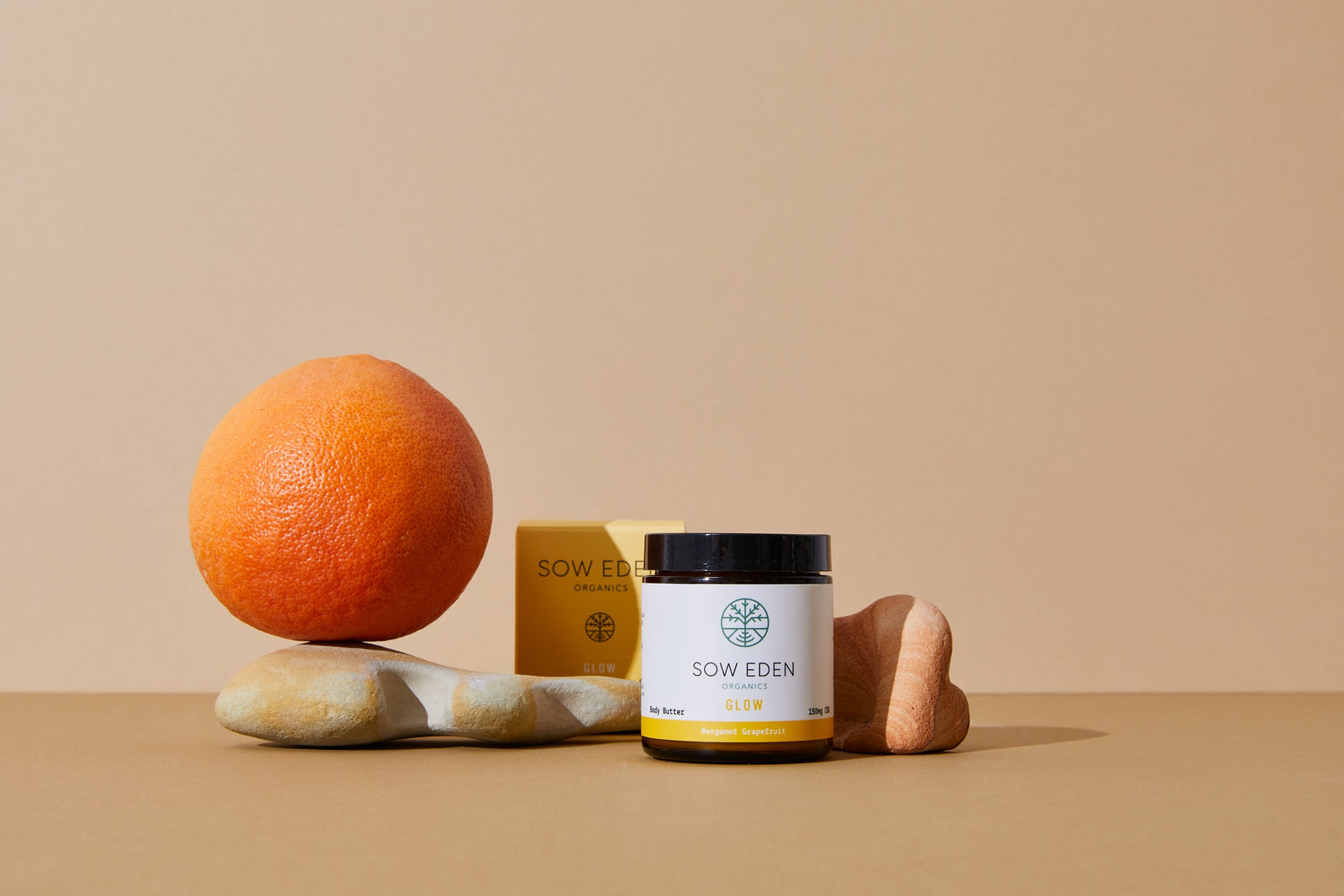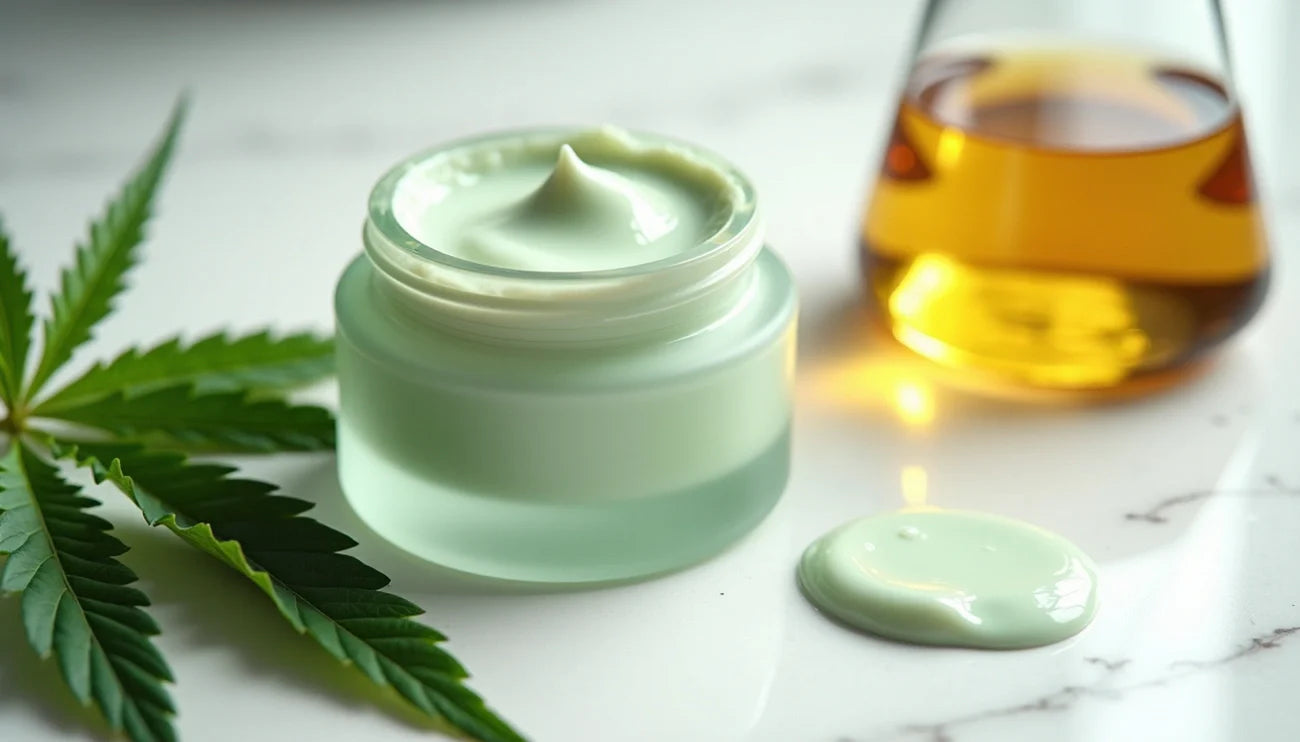The Natural Revolution in Skincare: CBD's Promising Benefits
What are the benefits of CBD in skincare and why is it becoming a staple in beauty routines worldwide? Here's a quick answer:
| CBD Skincare Benefits | How It Works |
|---|---|
| ✓ Anti-inflammatory | Interacts with skin's endocannabinoid system to reduce redness and irritation |
| ✓ Sebum regulation | Balances oil production, beneficial for acne-prone skin |
| ✓ Antioxidant protection | Neutralizes free radicals that cause premature aging |
| ✓ Hydration & barrier support | Helps maintain moisture and strengthens skin's natural barrier |
| ✓ Soothing properties | Calms sensitive, reactive skin conditions |
The skincare industry has witnessed countless trends come and go, but CBD (cannabidiol) has proven itself more than just a passing fad. As consumers increasingly seek natural solutions for their skin concerns, CBD has emerged as a powerhouse ingredient backed by promising research. Unlike many trendy ingredients, CBD works with your body's own systems to potentially address multiple skin issues simultaneously.
What makes CBD unique is its ability to interact with our skin's endocannabinoid system - a complex network of receptors that helps maintain skin homeostasis. This interaction may explain why CBD shows promise for such a wide range of skin conditions, from acne and eczema to everyday redness and irritation.
I'm Jacob Dunn, CEO of Sow Eden Organics, and my journey exploring what are the benefits of CBD in skincare began when I witnessed how our broad-spectrum CBD formulations transformed customers' skin concerns where conventional products had failed. Let me guide you through the science-backed benefits that have made CBD a addition to modern skincare routines.
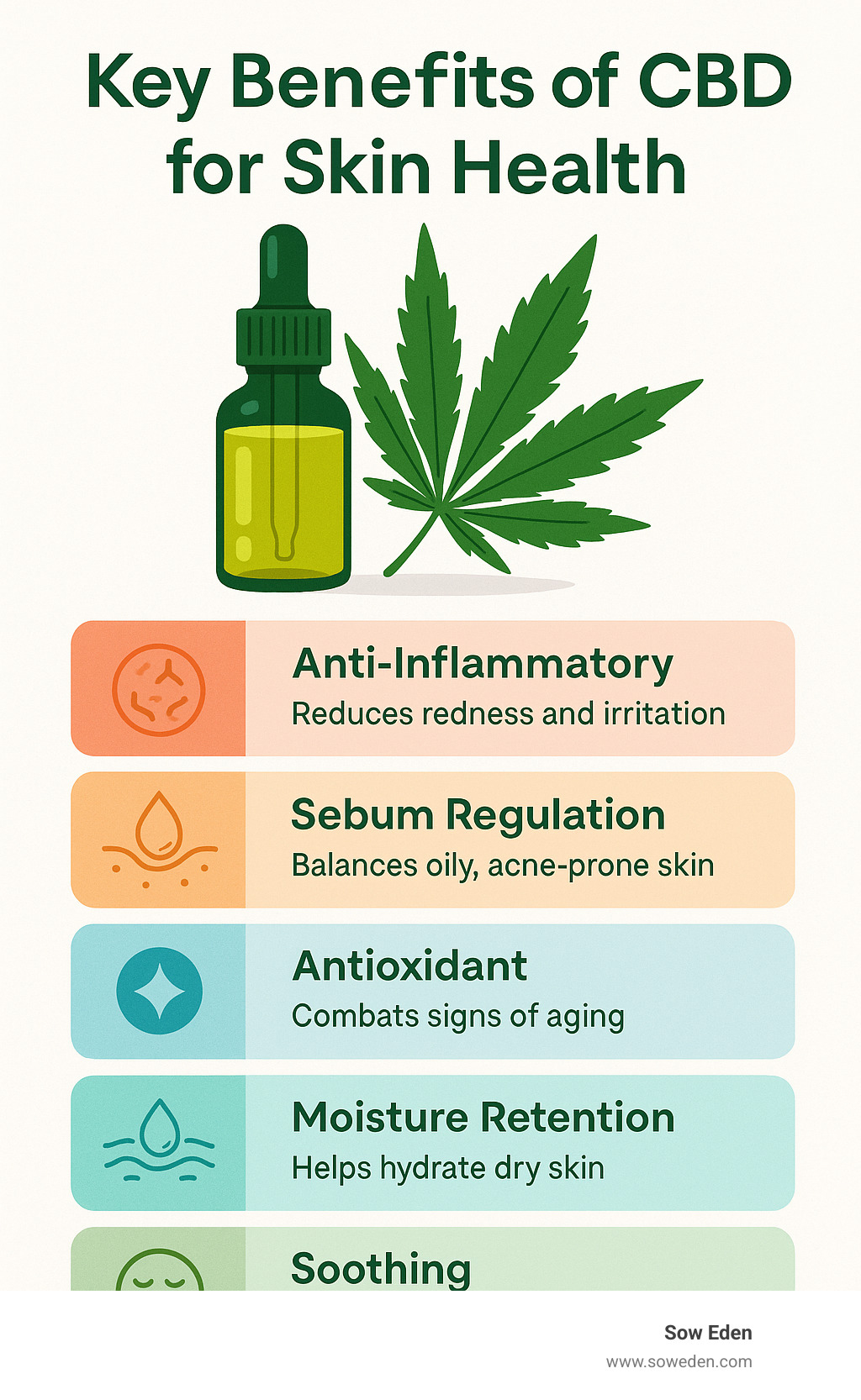
Quick what are the benefits of cbd in skincare definitions: - hemp cream benefits - side effects of cbd cream
CBD 101: What Makes It Different From Hemp Seed Oil and THC?
Let's clear up some confusion before we dive into the good stuff. When I first entered the CBD world, even I was puzzled by all the similar-sounding terms!
CBD (cannabidiol) is just one of over 100 natural compounds called phytocannabinoids found in the cannabis plant. The big difference between CBD and its famous cousin THC? CBD won't get you high – not even a little bit. This non-psychoactive nature is precisely why CBD has found its way into our skincare routines without raising eyebrows.
Another common mix-up happens with hemp seed oil. Think of it this way: same plant family, different parts, different benefits:
| Ingredient | Source | Key Components | Skincare Benefits |
|---|---|---|---|
| CBD | Flowers, leaves, stems | Cannabinoids | Anti-inflammatory, sebum-regulating, antioxidant |
| Hemp Seed Oil | Seeds only | Fatty acids, no cannabinoids | Moisturizing, contains omega 3-6-9 |
| THC | Flowers, leaves | Psychoactive cannabinoid | Not typically used in skincare (≤0.3% in legal products) |
Thanks to the 2018 Farm Bill, hemp-derived CBD products are federally legal as long as they contain no more than 0.3% THC. This tiny amount can't produce any high but may contribute to what scientists call the "entourage effect" – where cannabinoids work better together than alone.
Pure CBD, Broad-Spectrum, or Isolate—Which One Lands on Your Shelf?
When browsing CBD skincare, you'll spot these three main types:
Full-spectrum CBD contains everything naturally found in the hemp plant, including that tiny legal amount of THC (≤0.3%). Many users prefer this for the complete entourage effect.
Broad-spectrum CBD offers multiple cannabinoids but with THC completely removed. At Sow Eden, we've found this sweet spot works best – our formulations combine broad-spectrum CBD with CBD-A and CBG-A for maximum benefits without any THC concerns.
CBD isolate is the purest form – just the CBD molecule all by itself. While potent, it's like having a solo violinist instead of the whole orchestra playing together.
Smart shopping for CBD skincare means checking a few key details:
Look for clear potency labeling in mg/ml – vague terms like "high strength" don't tell you much. A reputable brand will also provide a Certificate of Analysis (COA) from third-party testing. The gold standard? Tests from ISO 17025 accredited labs, which have met rigorous quality requirements.
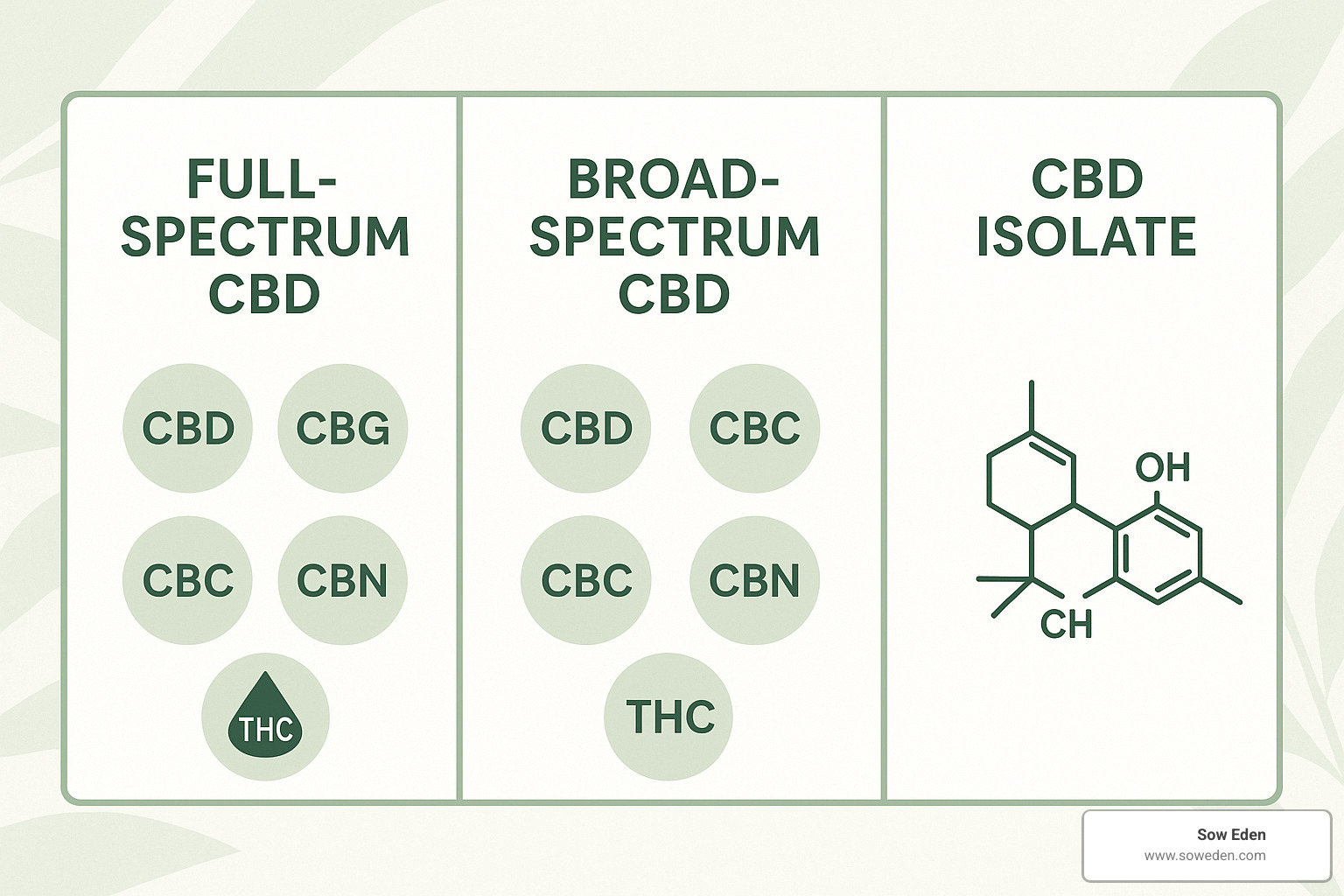
When asking what are the benefits of CBD in skincare, the type of CBD extract used can significantly impact your results. That's why understanding these differences helps you make smarter choices for your skin's needs.
How Does CBD Work on Your Skin? The Endocannabinoid System Explained
The reason CBD shows such promise in skincare lies in our body's endocannabinoid system (ECS). This complex cell-signaling system was only finded in the 1990s but has revolutionized our understanding of skin physiology.
The skin, our largest organ, contains a high concentration of endocannabinoid receptors. The two main types are:
- CB1 receptors: Primarily found in the central nervous system but also present in skin cells
- CB2 receptors: Abundant in immune cells and skin cells, especially keratinocytes, melanocytes, and sebocytes
CBD interacts with these receptors, as well as TRPV channels (transient receptor potential vanilloid), which are involved in inflammation and pain sensation. While our bodies produce their own endocannabinoids (like anandamide and 2-AG), phytocannabinoids like CBD can supplement this system.
Research published in the Journal of Dermatological Science has shown that the ECS plays a crucial role in: - Regulating skin cell growth and differentiation - Controlling sebum production - Managing inflammation responses - Maintaining skin barrier function
This explains why CBD can address multiple skin concerns simultaneously—it works with your skin's natural regulatory system rather than simply treating symptoms.
Inflammation Signalling & Barrier Repair Pathways
CBD's effects on skin go beyond basic receptor interaction. Studies show it influences several key cellular pathways:
NF-κB Pathway: CBD inhibits the nuclear factor kappa B (NF-κB) signaling pathway, a master regulator of inflammation. By dampening this pathway, CBD can reduce the production of pro-inflammatory cytokines that cause redness and irritation.
Cytokine Modulation: Research indicates CBD reduces the production of cytokines like IL-6 and TNF-α, which are liftd in inflammatory skin conditions like psoriasis and eczema.
Ceramide Production: CBD may improve ceramide production, which strengthens the skin barrier. Ceramides are lipid molecules that help retain moisture and protect against environmental stressors.
Aquaporin-3 Expression: Some studies suggest CBD influences aquaporin-3 channels, which regulate water transport in skin cells, potentially improving hydration.
This multi-faceted approach to skin homeostasis is what makes CBD such a versatile skincare ingredient. By working with your skin's natural systems rather than against them, CBD supports overall skin health from within.
What are the Benefits of CBD in Skincare?
Now that we understand how CBD works with our skin's biology, let's explore the specific benefits it offers. Both research and real-world results have revealed several compelling reasons to consider adding CBD to your skincare routine:
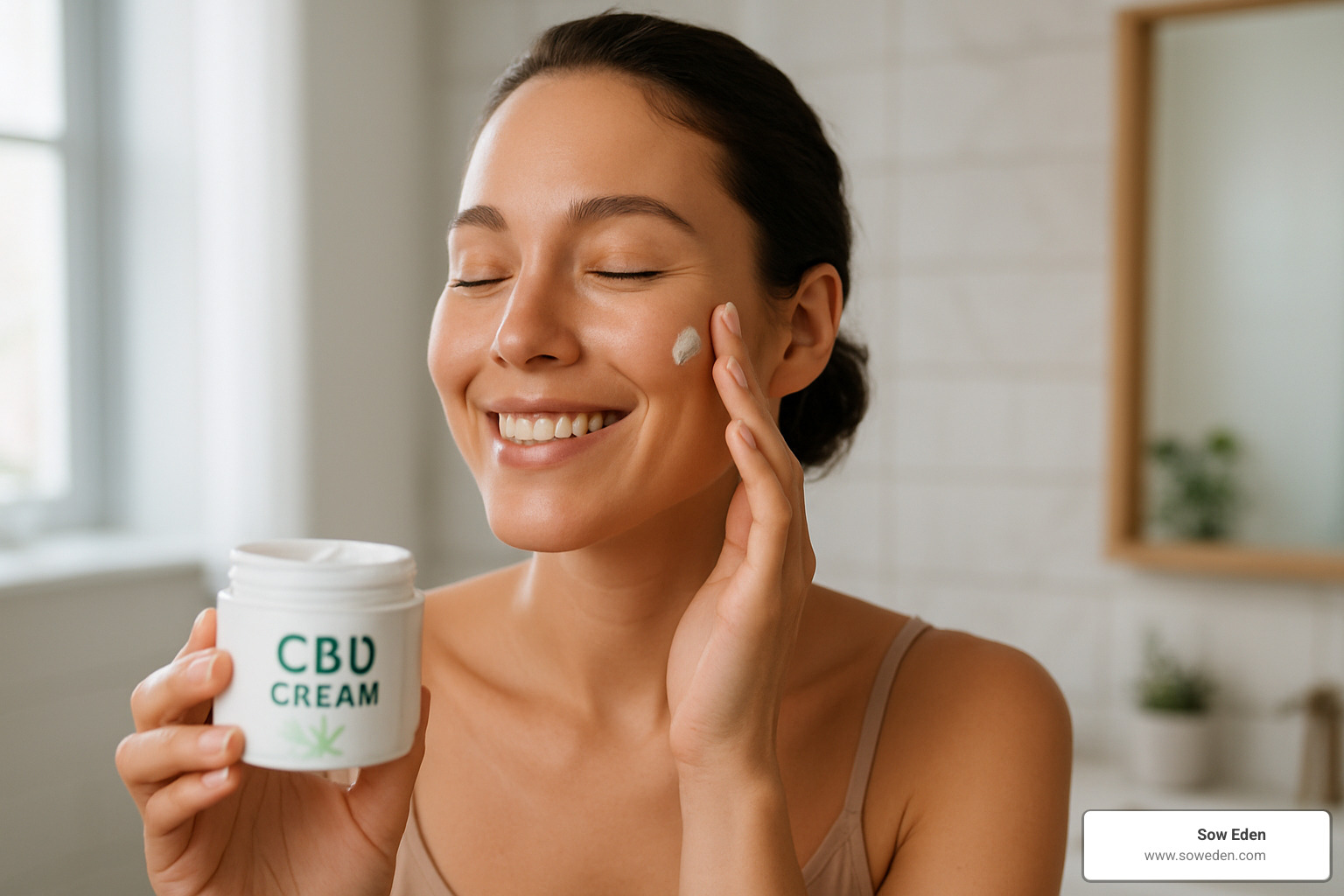
Anti-Inflammatory, Redness-Reducing & Soothing Power
If you've ever battled with redness or irritation, CBD might become your new best friend. Its anti-inflammatory properties are perhaps its most celebrated skincare benefit.
What are the benefits of CBD in skincare for reactive skin types? It's like having a built-in calming system. When your skin flares up from environmental triggers or product sensitivities, CBD helps dial down that inflammatory response at the cellular level.
For those with psoriasis, the research looks promising. A 12-week split-body trial showed that a topical 2.5% CBD ointment significantly reduced scaling without major side effects. Similarly, 67% of eczema sufferers in a small study reported less itchiness after using a CBD gel.
Even rosacea, with its characteristic flushing, may respond to CBD's ability to inhibit inflammatory pathways and reduce blood vessel dilation. By suppressing pro-inflammatory molecules like IL-6 and TNF-α, CBD essentially tells your skin to take a deep breath and relax.
A 2019 study in La Clinica Terapeutica found that applying a CBD-enriched ointment twice daily for three months significantly improved inflammatory skin parameters without causing irritation – exactly what sensitive skin needs.
Antioxidant & Anti-Aging Support
Move over vitamins C and E – some research suggests CBD might be an even more powerful antioxidant. This makes it a valuable ally in your anti-aging arsenal.
Free radicals from pollution, UV rays, and other environmental stressors are like tiny thieves stealing your skin's youthful appearance. CBD acts as security, neutralizing these troublemakers before they can cause damage that leads to fine lines and wrinkles.
By protecting collagen (your skin's support structure) from oxidative breakdown, CBD helps maintain firmness and elasticity. It also supports cell turnover, helping to brighten dull complexions by encouraging the removal of damaged cells.
The science behind this is fascinating – CBD activates the NRF-2 pathway and induces heme oxygenase-1, which are your skin's natural defense mechanisms against oxidative stress. Think of it as strengthening your skin's internal shield against aging factors.
Sebum Modulation & Blemish Control – What are the benefits of CBD in skincare for acne?
For the millions battling breakouts, what are the benefits of CBD in skincare are particularly exciting. Rather than just addressing one aspect of acne, CBD offers a comprehensive approach.
Unlike harsh treatments that strip your skin, CBD works to bring balance. It can normalize excessive oil production through the AMPK/SREBP-1 pathway in sebocytes (your oil-producing cells), while simultaneously calming the redness and inflammation of active breakouts.
CBD may also help manage Cutibacterium acnes bacteria and, over time, some research suggests it might help normalize the appearance of enlarged pores. A small, single-blind, split-face study found that a cream with 3% Cannabis seed extract applied twice daily for 12 weeks effectively reduced both sebum production and redness in acne patients.
What makes CBD truly unique for breakout-prone skin is its balancing act – potentially helping both oily and dry areas at the same time, without the excessive dryness that many conventional treatments cause.
Hydration & Barrier Strength – What are the benefits of CBD in skincare for dryness?
A healthy skin barrier is your first line of defense against the world, and CBD helps keep it strong and well-hydrated.
CBD may reduce transepidermal water loss (TEWL) – the scientific term for moisture escaping your skin – by supporting the tight-junction proteins that act like seals between skin cells. Think of these proteins as the mortar between bricks; when they're strong, your skin retains moisture better.
Many CBD formulations pair cannabidiol with omega-rich carrier oils, creating a perfect combination for barrier support. These essential fatty acids complement your skin's natural lipids, helping to lock in hydration.
A 2020 review found that topical CBD may help with inflammatory skin conditions specifically by restoring barrier function and reducing dryness. At Sow Eden, we improve these hydrating properties by combining our CBD with natural botanicals that further support your skin's moisture balance.
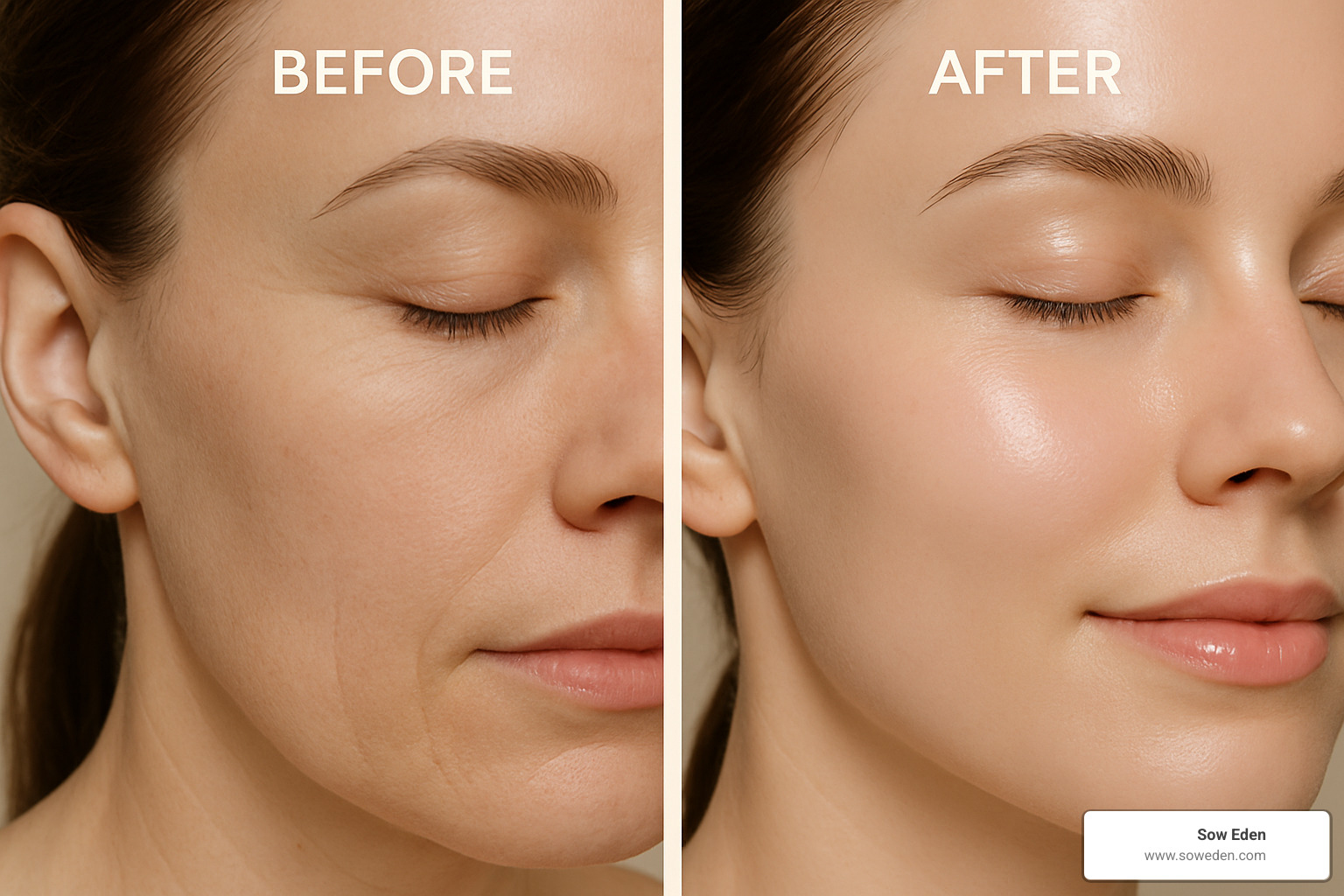
Antimicrobial & Itch-Blocking Extras
Beyond the major benefits, CBD offers some impressive bonus features that make it even more valuable for skin health.
If you've ever experienced the maddening cycle of itch-scratch-itch, you'll appreciate CBD's ability to interrupt this pattern. It interacts with CB1 receptors and TRPV1 channels in the skin to reduce pruritus (the fancy medical term for itching). A 3-week study with 21 patients experiencing uremic pruritus found that an endocannabinoid-containing cream completely eliminated itching in over 38% of participants, with another 52% reporting significant relief.
CBD also shows antimicrobial activity against certain bacteria, including Staphylococcus aureus, which can worsen skin conditions. Additionally, it may help modulate histamine-related inflammatory responses, potentially reducing allergic reactions on the skin.
These "extra" benefits make CBD particularly valuable for sensitive, reactive skin types that struggle with itching or bacterial imbalance – addressing multiple concerns with one ingredient.
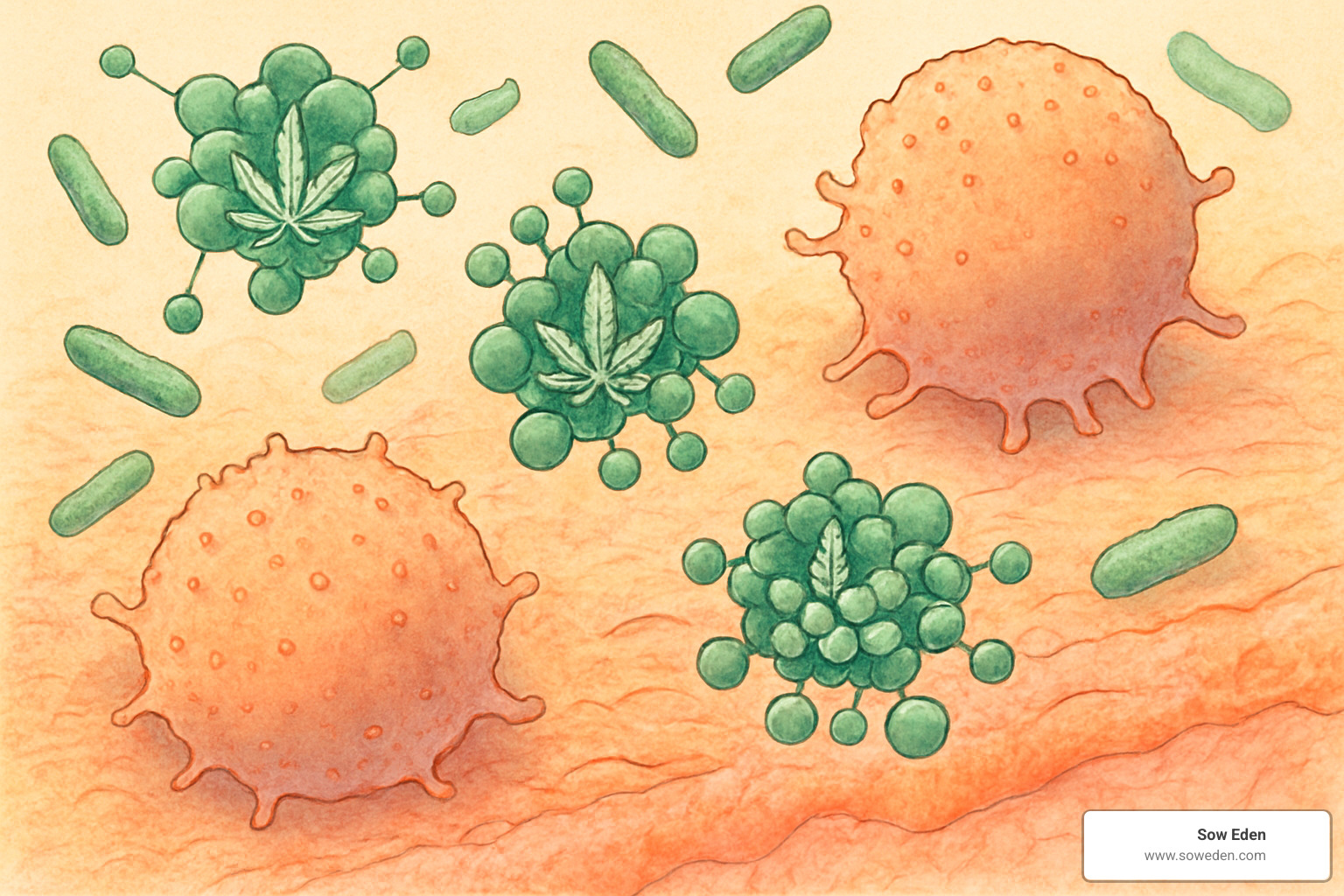
Smart Shopping: How to Choose and Use CBD Skincare Safely
Let's face it—the CBD skincare aisle can feel like a maze. With so many products claiming miraculous benefits, how do you find ones that actually deliver? I've been guiding customers through this journey for years, and there are some reliable signposts to look for.
Third-party testing is your best friend when shopping for CBD skincare. Think of it as your product's report card—independent labs verify what's actually in the bottle. At Sow Eden, we consider this non-negotiable. Every batch gets tested to confirm CBD content and screen for unwanted guests like pesticides, heavy metals, and microbial contaminants.
Organic sourcing matters tremendously with hemp. Here's why: hemp plants are natural sponges that absorb whatever's in the soil around them. That's fantastic when the soil is rich with nutrients, but problematic if there are chemicals present. We use only premium organic CBD extracted from carefully cultivated hemp to ensure what touches your skin is pure.
The carrier oils in your CBD products aren't just passive ingredients—they're active partners. Look for formulations with nourishing carriers like hemp seed oil, jojoba oil, or argan oil that complement CBD's benefits and help it penetrate effectively.
Always perform a patch test before applying a new CBD product to your face. Even natural ingredients can sometimes trigger reactions, especially if you have sensitive skin. A small test on your inner wrist or behind your ear can save you from unwanted surprises.
There are also some special considerations to keep in mind: - Pregnancy/nursing: The FDA currently advises against using CBD products during pregnancy or while breastfeeding due to limited research - Medication interactions: CBD can interact with medications metabolized by the liver, particularly those with a "grapefruit warning" - Legal status: While federally legal under the 2018 Farm Bill, some state laws regarding CBD may vary slightly
Reading the Label Like a Pro
Becoming a savvy label reader helps ensure you're getting quality CBD skincare instead of just clever marketing.
First, check for "Cannabidiol" on the ingredient list. Don't be fooled by products that only list "cannabis sativa oil"—that could simply be hemp seed oil without any actual CBD.
Look for the total milligrams of CBD in the product, not just percentages. This tells you the actual potency you're getting. A small bottle with a high concentration might contain the same amount of CBD as a larger bottle with a lower percentage.
Reputable products include batch numbers that can be cross-referenced with lab reports. This traceability is a hallmark of brands that have nothing to hide.
Many quality brands now include QR codes linking directly to third-party lab results. At Sow Eden, we believe transparency builds trust—you should be able to verify what you're putting on your skin.
Finally, scan the full ingredients list. The best CBD products avoid artificial fragrances, parabens, or other potential irritants that might counteract CBD's soothing benefits. We prioritize clear labeling of our CBD-A and CBG-A content alongside complementary botanical ingredients so you know exactly what you're getting.
Best Practices for Application & Layering
Getting the most from your CBD skincare isn't just about what you buy—it's about how you use it.
Follow a proper sequence to maximize absorption and benefits. Think of it as building layers of goodness: cleanse to create a clean canvas, tone to balance, apply CBD treatment products while skin is still slightly damp, then seal everything in with a moisturizer.
Consider timing your application strategically. In the morning, lighter CBD formulations work well under sunscreen without feeling heavy. Evening is perfect for richer CBD treatments that can work their magic overnight when your skin naturally enters repair mode.
Always pair daytime CBD products with proper sun protection. Some research suggests CBD may make skin more sensitive to UV rays, so sunscreen isn't optional—it's essential.
Consistency is key with CBD skincare. Unlike some ingredients that deliver immediate results, CBD works best when used regularly over time. Your skin's endocannabinoid system responds to steady, consistent support rather than occasional treatments.
When layering with other active ingredients, CBD generally plays well with hydrating ingredients like hyaluronic acid and niacinamide. However, use caution when combining with potent actives like retinol or AHAs until you know how your skin responds. Start with alternate days if you're unsure.
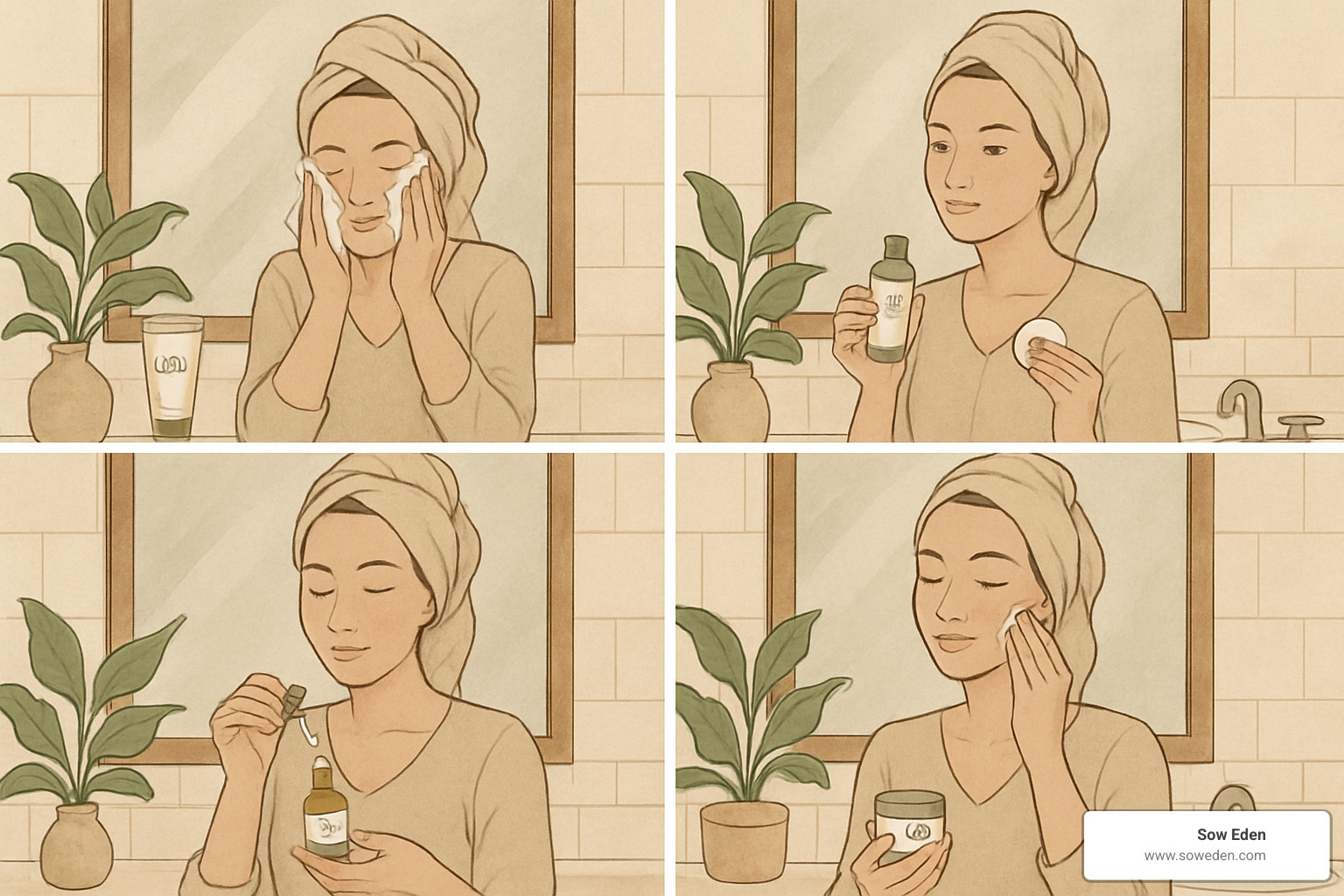
Risks, Side Effects & Research Gaps
While I've shared the exciting benefits of CBD skincare, I believe in giving you the full picture. Let's talk about the potential downsides and where the science is still catching up.
CBD skincare is generally well-tolerated, but some people might experience:
- A mild tingling or burning sensation (usually temporary and fades quickly)
- Contact dermatitis in those with particularly sensitive skin
- Occasional dryness, especially with higher-concentration products
Don't worry too much though! A 2020 review found these side effects are typically much milder than what you might experience with conventional skincare ingredients like retinol or chemical exfoliants. Most people find CBD remarkably gentle.
The research world is still expanding our understanding of what are the benefits of CBD in skincare. While the results so far are promising, it's worth noting some limitations:
Many studies use smaller sample sizes than ideal. The long-term effects of regular topical CBD application are still being documented through ongoing research. And scientists are still working to determine the perfect concentrations for specific skin concerns like acne versus eczema.
Here's something important to consider: CBD can affect how your body processes certain medications by inhibiting cytochrome P450 enzymes in the liver. The good news is that topical CBD results in minimal absorption into your bloodstream compared to ingested CBD. Still, if you're taking multiple medications, it's always wise to check with your healthcare provider before adding CBD skincare to your routine.
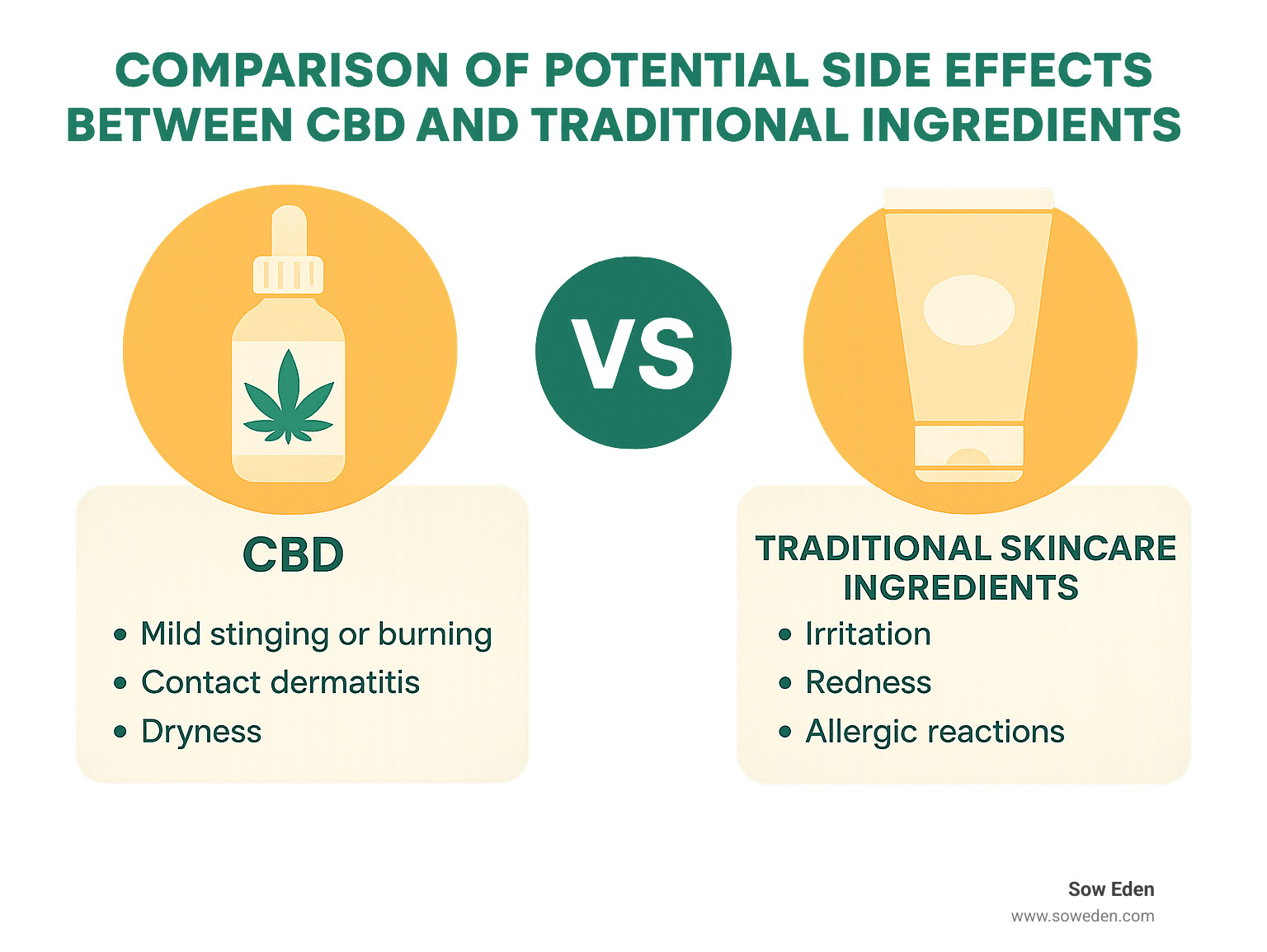
The good news? Clinical trials investigating CBD for various skin conditions are currently underway. The scientific research on CBD interactions continues to evolve, and our understanding grows more sophisticated each year.
At Sow Eden, we stay on top of emerging research to ensure our formulations reflect the latest understanding of how CBD interacts with your skin. We believe in transparency about both the known benefits and the areas where science is still developing.
Everyone's skin is unique. What works beautifully for one person might not work as well for another. That's why we always recommend starting with a patch test and paying attention to how your skin responds to any new product—CBD included!
Frequently Asked Questions about CBD Skincare
Will CBD get me high if I apply it topically?
Absolutely not! This is one of the most common concerns I hear, and I'm happy to put your mind at ease. CBD is naturally non-psychoactive, unlike its cousin THC (the compound responsible for that "high" feeling).
When you apply CBD to your skin, it works primarily with your local skin cells and rarely enters your bloodstream in significant amounts. Plus, all legal CBD skincare products must contain less than 0.3% THC by law – an amount far too tiny to cause any mind-altering effects even if absorbed systemically.
At Sow Eden, we take this a step further by using broad-spectrum CBD that contains zero THC, giving you peace of mind along with all the skin-loving benefits.
How long before I see results from a CBD cream?
This is where patience becomes your friend! Your skin's response timeline depends on what you're hoping to address:
For redness and irritation, many of our customers report feeling a soothing effect almost immediately – that cooling, calming sensation can be quite dramatic if you're dealing with angry, inflamed skin.
When tackling acne and blemishes, give yourself 2-4 weeks of consistent use. CBD works by balancing oil production and calming inflammation, which takes time to normalize.
For hydration and barrier repair, you'll likely notice improvements within 1-2 weeks as your skin's moisture balance is restored.
The anti-aging benefits require the most patience – typically 4-12 weeks for visible results, as CBD supports your skin's natural renewal processes.
Consistency is your best friend! In clinical studies showing positive results, participants typically applied CBD products twice daily. At Sow Eden, we suggest giving our formulations at least 30 days of regular use to truly see how they transform your skin.
Can I combine CBD with retinoids or AHAs?
Good news – CBD plays quite nicely with other skincare actives! In fact, CBD's natural calming properties can actually help buffer the potential irritation sometimes caused by powerhouse ingredients like retinoids and alpha hydroxy acids (AHAs).
Think of CBD as the peacekeeper in your skincare routine. Many dermatologists actually recommend applying CBD products after retinoids to help minimize that dreaded retinol redness and flaking.
That said, I always recommend a thoughtful approach when mixing potent ingredients:
First, make sure your skin tolerates each ingredient individually before combining them. Then start by alternating days – perhaps retinoid one night, CBD the next. If your skin seems happy, you can gradually progress to using both in the same routine.
What are the benefits of CBD in skincare when paired with other actives? Beyond reducing potential irritation, this combination approach can give you the best of both worlds – the targeted treatment of ingredients like retinoids along with the balancing, soothing properties of CBD.
If you ever experience persistent irritation with any combination, simply dial back and give your skin a chance to adjust. Your skin is unique, and finding your perfect routine is a personal journey!
Conclusion
When it comes to skincare innovation, CBD stands out as more than just another passing trend. The benefits of CBD in skincare represent a genuine breakthrough in how we approach natural skin health – working with our body's own systems rather than fighting against them.
Throughout this guide, we've explored what are the benefits of CBD in skincare and finded how this remarkable plant compound offers a multi-faceted approach to various skin concerns. From calming angry, inflamed skin to balancing oil production, providing powerful antioxidant protection, and strengthening your skin's natural barrier – CBD offers something truly special in plant-powered skincare.
What makes CBD particularly valuable is its versatility. Whether you're dealing with acne breakouts, sensitive skin that reacts to everything, early signs of aging, or persistent dryness, CBD can be incorporated into a routine that addresses your specific needs. It's this adaptability that has made it a staple in so many skincare routines.
At Sow Eden, we've seen how our organic CBD formulations have transformed customers' skin. By thoughtfully combining CBD-A and CBG-A with complementary botanicals like Ginger Root and Lemon Peel, we've created products that support not just the appearance of your skin, but its fundamental health and balance.
Consistency is key with CBD skincare. The endocannabinoid system responds best to regular, ongoing support rather than one-time applications. Give your products time to work with your skin's natural renewal cycles, and you'll likely be rewarded with the improvements you're seeking.
The future of CBD in skincare looks incredibly promising. As research continues to evolve, we expect to find even more about how this remarkable plant compound interacts with our skin. What's already clear is that CBD offers a gentle yet effective alternative that works in harmony with your body's natural processes.
Whether you're new to CBD skincare or looking to refine your existing routine, we hope this guide has illuminated the science-backed benefits that make CBD worth considering. For those ready to experience these benefits firsthand, we invite you to explore Sow Eden's thoughtfully crafted formulations – where nature's wisdom meets modern science for truly radiant skin.
After all, beautiful skin isn't just about what you put on it – it's about supporting your body's natural ability to maintain balance. And that's exactly what makes CBD such a valuable addition to your skincare shelf.

